Immunisation for tamariki
Immunisation is also known as vaccination
Key points about childhood immunisation
- Vaccination protects your child from serious and sometimes fatal diseases.
- Vaccination on time is the most effective way to protect pregnant women, babies and children from preventable disease.
- Vaccinations begin during your pregnancy and for your child when they are 6 weeks of age.
- Vaccines on the National Immunisation Schedule are free in Aotearoa New Zealand for all babies, children and young people.
- The benefits of vaccination far outweigh the risks.
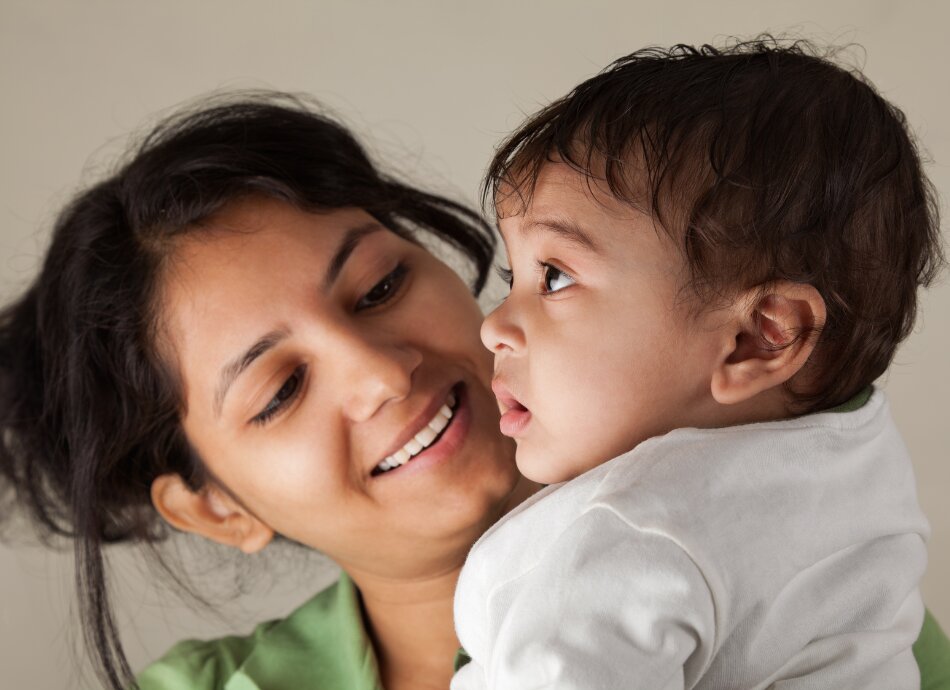
Immunisation involves receiving a vaccine to help your body's immune system protect you against a disease. Read more about how your immune system works.
Video: Immunise your child with confidence
Video: Immunisations: Protecting the Health of Your Child
(Health New Zealand | Te Whatu Ora, NZ, 2025)
In the past, many children died or were left with life-long problems from diseases including diphtheria, tetanus, polio, measles and whooping cough. Today, we use vaccines to immunise children against these and other diseases. Vaccines stimulate their immune system to produce antibodies, exactly like it would if they were exposed to the disease. The child will develop immunity to that disease, but they don't have to get sick first. This is what makes vaccines such a powerful medicine. Read more about why you should vaccinate.
Video: Ngataiwhakaki's 6 week immunisations
(Health New Zealand | Te Whatu Ora, NZ, 2023)
Video: Immunisation a parent's view
The National Immunisation Schedule(external link) lists the group of vaccines that are offered free to babies, children, adolescents and adults. The schedule lists the vaccines and the age at which they should be given.
| Vaccines against the following diseases are available free-of-charge for babies and children in Aotearoa New Zealand | |
|---|---|
|
|
Image credit: Health New Zealand | Te Whatu Ora, 2023
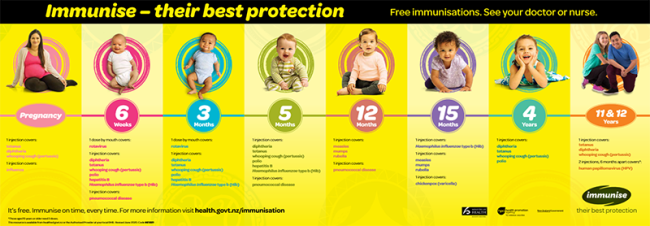
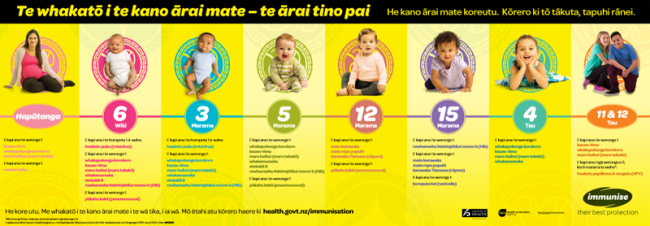
Image credit: Ministry of Health, NZ
These diseases can cause serious problems, and can sometimes be fatal. Vaccination is the best protection against them. Vaccination may not always stop these diseases, but it can reduce the problems they cause. Read more about vaccines available in Aotearoa New Zealand.
Video: Be on time. Immunise on time, every time
(Ministry of Health, NZ, 2017)
Video: Te Kano Ārai Mate ā-kura – information about school immunisations in te reo Māori
The video below (Te Kano Ārai Mate ā-kura) provides information about school immunisations in te reo Māori.
(Health New Zealand | Te Whatu Ora, NZ, 2023)
Some children may need to have their vaccines at different times to the schedule. For example, babies at high risk of hepatitis B may be offered hepatitis B immunisation earlier than others. If they're at risk of tuberculosis they may also need the BCG vaccine to protect against tuberculosis. Discuss your child’s own needs with your healthcare provider.
Funded and unfunded vaccines can be given by your doctor, nurse, midwife and some pharmacists who have been trained as vaccinators.
Different providers may have restrictions on what vaccinations can be given or the ages of people they can administer these to. So it’s worth checking with the provider first to see if your child can get the vaccination needed from them.
There are many different settings in which you can get a vaccination. These include medical or health centres, pharmacies, community-based clinics including marae-based clinics, mobile health clinics and mobile vaccination services.
Read more about who can give vaccinations and where to get vaccinated.
Vaccinations are most often given as injections in your child's arm or leg, but the rotavirus vaccine is given as drops into their mouth.
Parents can help in a number of ways.
- Check which vaccines you need to have during your pregnancy.
- Start vaccinating your baby on time at 6 weeks of age.
- For young children, book your appointment early in the day and plan a calm day afterwards.
- Bring along a stuffed toy or blanket for your child to hold during the vaccination, or use them to distract your child.
- For babies, feed your child straight after their vaccination; this can help to calm your baby.
- Hold your child firmly, talk calmly and gently stroke your child's arm or back.
- After being pricked by the needle, your child may cry. Try to stay calm and relaxed. Hold them, comfort them and talk calmly.
- You will need to stay for 20 minutes after the vaccination, so bring something to keep your child busy afterwards.
Read more tips for preparing for a vaccination(external link).
About 1 in 10 children have a reaction to vaccinations. Most of these reactions are mild, eg, fever or redness at the injection site. These reactions show that their immune response is building and the vaccine is working. Read more about after your child is immunised(external link) and tips following immunisation(external link).
Very rarely, a serious allergic reaction (anaphylaxis) can happen. This happens very shortly after the injection which is why you must wait for 20 minutes after vaccination. If you're worried, ask to see the nurse or doctor straight away.
Video: Year 7 immunisation: Protect against tetanus, diphtheria and whooping cough
Duane and Hinetaapora talk about getting immunised against tetanus, diphtheria and whooping cough (pertussis). What does immunisation do and why do you need it? What are immunisations for and how do they work? How do you get parental consent?
(Health New Zealand | Te Whatu Ora, NZ, 2023)
Video: Te Kano Ārai Mate ā-kura – information about school immunisations in te reo Māori
In this te reo video, Duane and Hinetaapora talk about getting immunised against tetanus, diphtheria and whooping cough (or pertussis). What does immunisation do and why do you need it? What are immunisations for and how do they work? How do you get parental consent?
Video: Immunisation Year 8 protection against HPV
Hinetaapora talks about getting immunised against the human papillomavirus (HPV). What is HPV immunisation and why do you need it?
(Health New Zealand | Te Whatu Ora, NZ, 2023)
Vaccination is not compulsory in Aotearoa New Zealand but it's a good choice. There's a lot of information about vaccination and this can be confusing. It's important to check where the information is from so you can make a good choice. Here are some things to think about:
- Is it based on sound evidence?
- Is it up-to-date information?
- Does it relate to Aotearoa New Zealand?
The following links provide more information on vaccination:
Vaccination Healthline(external link)
Freephone 0800 28 29 26, weekdays 8.30am – 5pm. Vaccination advice and support to book appointments via Book my Vaccine(external link)(external link), including group bookings. Interpreters are available and you can choose to speak with a Māori or Pacific advisor, a disability advisor, or use NZ Relay.
Immunisation and recommended times [PNG, 231 KB] Health New Zealand | Te Whatu Ora
Vaccine-preventable diseases(external link) Immunisation Advisory Centre, NZ
Information about immunisation in NZ(external link) Health New Zealand | Te Whatu Ora
Resources
Set your tamariki up for a healthy future(external link) HealthEd, NZ, 2024 te reo Māori(external link), Samoan(external link), Tongan(external link), Niuean(external link), Cook Islands Māori(external link)
Childhood immunisation booklet(external link) HealthEd, NZ, 2023
New Zealand National Immunisation Schedule(external link) Immunisation Advisory Centre, NZ, 2024
Immunisation register for early childhood services and primary schools(external link) HealthEd, NZ, 2024 English(external link), te reo Māori(external link)
Immunisation guidelines for early childhood services and primary schools(external link) HealthEd, NZ, 2023
Immunisation certificate(external link) HealthEd, NZ, 2024
References
- Immunisation Handbook 2024 version 1(external link) Health New Zealand | Te Whatu Ora, 2025
Immunisation Advisory Centre (IMAC)(external link)
Freephone 0800 IMMUNE (0800 466 863), weekdays 8.30am-4.30 pm. A local source of independent, factual information based on international and New Zealand based scientific research. Clinical information and training for health professionals.
Brochures
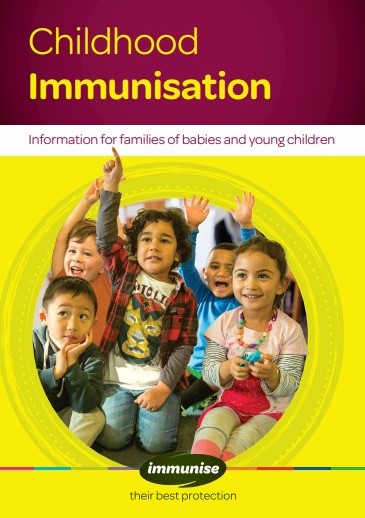
HealthEd, NZ, 2023
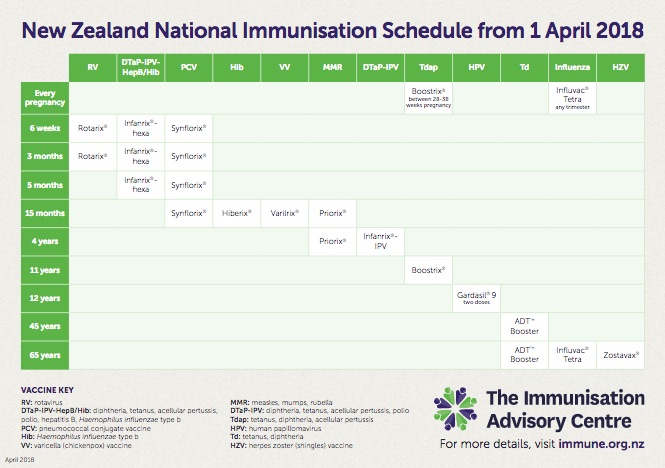
Immunisation Advisory Centre, NZ, 2023
Immunisation and recommended times
Health New Zealand | Te Whatu Ora, 2023
Credits: Healthify editorial team. Healthify is brought to you by Health Navigator Charitable Trust.
Reviewed by: Stephanie Yee, Pharmacist, Auckland
Last reviewed:
Page last updated:





